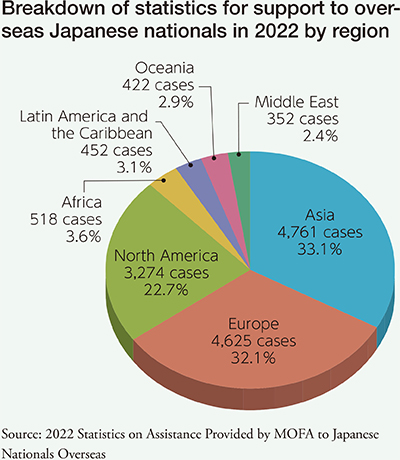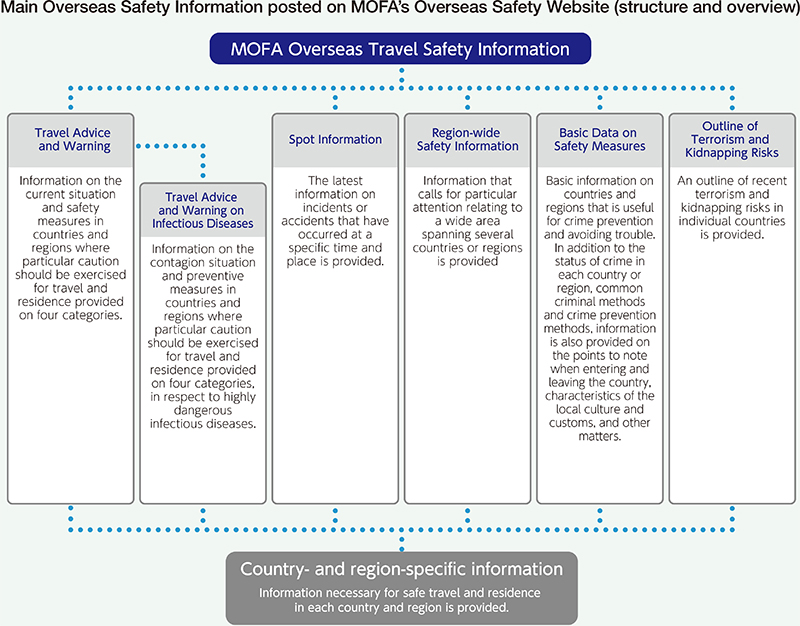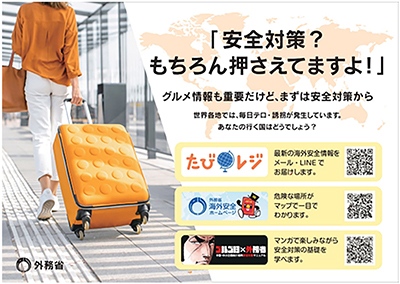Diplomatic Bluebook 2024
Chapter 4
Japan's Diplomacy Open to the Public
Section 2 Supporting Japanese Nationals Overseas
1 Risks and Safety of Japanese Nationals Overseas
(1) Incidents and Accidents in 2023 and Responses to them
As of 2023, approximately 9.62 million1 Japanese nationals traveled overseas over the course of the year, and as of October that year approximately 1.29 million Japanese nationals live abroad. Protecting the lives of Japanese nationals traveling and residing abroad, as well as promoting their interests, is one of the most important missions of the Ministry of Foreign Affairs (MOFA).
There has been no Japanese victim of terrorism incidents since 2020. However, 2023 was another year in which a large number of terrorist attacks occurred in various regions. The main terrorism incidents included a suicide bombing in Ankara, Türkiye (September), a mass stabbing in Arras, France (October), shootings in Brussels, Belgium (October), and an attack on foreign tourists at a national park in Uganda (October). Moreover, terrorism incidents occurred frequently in the Middle East, such as in Iraq, Syria, Israel, and Afghanistan, as well as in Pakistan in Southwest Asia. Furthermore, many terrorism incidents occurred in Africa, such as in Burkina Faso, Mali, Niger, Nigeria, the Democratic Republic of the Congo, Somalia, and Mozambique.
In recent years, terrorist attacks have been occurring not only in the Middle East and Africa but also in Europe, North America, and Asia, where many Japanese nationals travel and reside. There continues to be a large number of homegrown terrorist attacks perpetrated by those born in Western countries and indoctrinated with extremist ideologies through websites or other means, terrorist attacks perpetrated by those acting on their own with little organizational background, and terrorist attacks in locations where unspecified large numbers of the general public gather on a daily basis. In North America and Europe, violent acts by far-left and far-right radicals, such as hate crimes motivated by animosity toward a particular race or ethnic group, have been intensifying in frequency. Moreover, the threat of terrorism is increasing due to reasons such as Islamic extremists expanding their scope of activities around the globe.
International travel rebounded rapidly in 2023 as the global impact of the COVID-19 pandemic showed signs of easing. The number of people traveling overseas accordingly showed an increasing trend compared to 2022 (approximately 2.77 million people). While the number of incidents in which Japanese nationals fell victim to crimes was low compared to before the pandemic, such incidents as well as traffic and mountain-climbing accidents continued to occur worldwide.
Natural disasters also occurred around the world and caused great damage. These included earthquakes in Türkiye (February), Morocco (September), and Afghanistan (October); wildfires in Hawaii, U.S. (August); and flooding in Libya (September).
In Africa, political turmoil occurred one after another in Niger (July) and in Gabon (August). In addition, clashes occurred in Sudan between government troops and the paramilitary Rapid Support Forces (RSF), principally around the capital, Khartoum. The Government of Japan accordingly raised the risk level for these countries, supporting the evacuation of Japanese nationals in April using Self‐Defense Forces (SDF) and government-chartered aircrafts. In the Middle East, terrorist attacks on Israel by Palestinian insurgents have grown into a large-scale conflict. In response, the Government of Japan raised the risk level for Israel, supporting Japanese nationals to leave the country using government-chartered and SDF aircrafts (October to November).
Whenever necessary, MOFA issues overseas travel safety information on infectious diseases in countries and regions where health and medical caution is required, in order to communicate the current outbreak situation and prevention measures, and highlight matters worth paying attention to when travelling and staying in the affected regions.
Regarding COVID-19 Travel Advice and Warning on Infectious Diseases, based on the situation including the broad improvement in the global infection situation and the World Health Organization (WHO) decision on May 5, 2023 that COVID-19 no longer constitutes a public health emergency of international concern (PHEIC), MOFA lifted Level 1 (Exercise Caution) on May 8 for the entire world. MOFA will continue to provide information to Japanese nationals residing or traveling abroad via its websites and consular e-mails in a timely and appropriate manner. In 2023, cases of Marburg virus disease infection were confirmed in Equatorial Guinea and Tanzania, in response to which MOFA issued region-specific information. Mosquito-borne diseases such as dengue fever have spread widely throughout Central and South America, as well as spreading in Asia and Africa.

- 1 Source: Japan National Tourism Organization (JNTO)
(2) Safety Measures for Japanese Nationals Overseas
The number of Japanese nationals receiving support or protection in 2022 from Japanese diplomatic missions overseas and the Japan-Taiwan Exchange Association was a total of 16,895, and the number of cases of support or protection was 14,404. Within these overall numbers, Japanese embassies and consulates-general worldwide provided detailed assistance in many ways such as support to Japanese nationals as well as disseminating information about entry/exit limitations and public safety.

The safety of Japanese nationals is threatened constantly in various regions throughout the world. Japanese nationals traveling abroad must be prepared for multiple risks such as terrorist attacks and infectious disease striking at the same time, and it is more difficult than ever to respond if Japanese travelers encounter a terrorist attack or another incident or accident while traveling overseas. Therefore, there is an increasing need to take every possible overseas safety measure.
Based on this perspective, MOFA works to enhance the safety awareness of Japanese nationals and promote its safety measures by disseminating information widely to the general public. Specifically, MOFA added panels to its Overseas Safety website page for easy access to the necessary information, and issues the latest safety information for each country and region on the website. Furthermore, MOFA sends emails on the latest safety information of travel destinations to Japanese residents and travelers who have registered with Overseas Residential Registrations or overseas travel registration service (Tabi-Regi).
MOFA is actively engaged in PR activities in order to promote registration on Tabi-Regi and submission of Overseas Residential Registrations. Examples of these initiatives include distributing information cards at all passport centers aimed at increasing awareness of Overseas Residential Registrations and Tabi-Regi, and thus raising their registration rate. In addition, in August, MOFA released a new promotional video on its official YouTube channel, in which the actors ISHIDA Hikari and MORITAKA Ai encourage registration on Tabi-Regi and submission of Overseas Residential Registrations. MOFA provides a Tabi-Regi linkage interface to travel industry operators, allowing them to batch register their passengers traveling abroad, and encourages companies to use it. Furthermore, MOFA contributed a booth to Tourism Expo Japan (Osaka) in October, providing information and raising attention to the safety of Japanese nationals residing or traveling abroad, including about Overseas Residential Registrations and Tabi-Regi. As of December 2023, the number of travelers who had registered on Tabi-Regi since its launch in July 2014 exceeded 8.58 million, reflecting initiatives for enhancing the system's convenience and activities that aim at promoting registration.
 The actors ISHIDA Hikari and MORITAKA Ai introduce Tabi-Regi (for people traveling overseas for less than three months) and Overseas Residential Registrations (for people living overseas for three months or more)
The actors ISHIDA Hikari and MORITAKA Ai introduce Tabi-Regi (for people traveling overseas for less than three months) and Overseas Residential Registrations (for people living overseas for three months or more)MOFA strives to enhance the knowledge and capability of the Japanese people concerning overseas safety measures and crisis management through seminars and training. In 2023, MOFA held virtual and in-person seminars on safety measures inside and outside Japan (11 times at diplomatic missions overseas and 10 times within Japan). Furthermore, Consular Affairs Bureau staff delivered lectures at seminars held throughout Japan by domestic organizations, associations, and other groups. In addition, MOFA also provided regular overseas safety information through voice platforms.
Furthermore, MOFA held “Public-Private Joint Practical Training for Counter-Terrorism and Anti-Kidnapping Measures,” both within Japan and abroad, with the participation of Japanese businesses and organizations. The Joint Practical Training outside Japan had been on hold since September 2019 due to the COVID-19 pandemic, but restarted in 2023 after an approximately 3.5-year hiatus. These initiatives are useful in preventing harm from regular crimes and terrorism, but also in improving response capabilities in the event of encountering such an incident.
Furthermore, the public and private sectors are cooperating to advance safety measures even overseas, and the diplomatic missions in each country host regular meetings of Security Consultation and Liaison Committees. Diplomatic missions are continuing to share information, exchange opinions, and bolster collaboration in preparation for emergencies with local Japanese nationals in their respective countries.
Following the terrorist attack in Dhaka in July 2016, MOFA developed and has utilized in educational activities “Golgo 13's Security Guidelines for Japanese SMEs Abroad,” with the aim of raising the awareness of international cooperation personnel, as well as small- and medium-sized enterprises (SMEs), students studying abroad, and short-term travelers, who have limited access to information on safety. Moreover, MOFA has continued to use the LINE messaging platform, through “Messages from Duke Togo” by the medium of “Golgo 13's Security Guidelines for Japanese SMEs Abroad,” to distribute educational messages about security measures and useful knowledge for people to protect themselves.
For Japanese nationals traveling abroad for the first time such as people on business trips, travelers, and students studying abroad, MOFA has created posters and flyers with 2D codes (QR codes) for access to Tabi-Regi, the Overseas Safety website, and “Golgo 13's Security Guidelines for Japanese SMEs Abroad,” distributing them to Japanese companies and the public.
 Overseas safety measures flyer (front)
Overseas safety measures flyer (front) Overseas safety measures flyer (back)
Overseas safety measures flyer (back)Many educational institutions do not have a sufficient base of knowledge and experience regarding safety measures and emergency response procedures. Due to this, for Japanese students heading abroad to study, MOFA staff deliver lectures and provide safety measures courses, including online sessions, at educational institutions such as universities, and also request cooperation to increase the submission of Overseas Residential Registrations and the rate of registration on Tabi-Regi. MOFA will continue to strive to help institutions to raise awareness of safety measures among their students and build in-house crisis management structures. MOFA is moving ahead with efforts to connect government agencies with educational institutions, overseas study agencies, and students studying abroad, by launching an automatic Tabi-Regi registration system together with some overseas study institutions.
